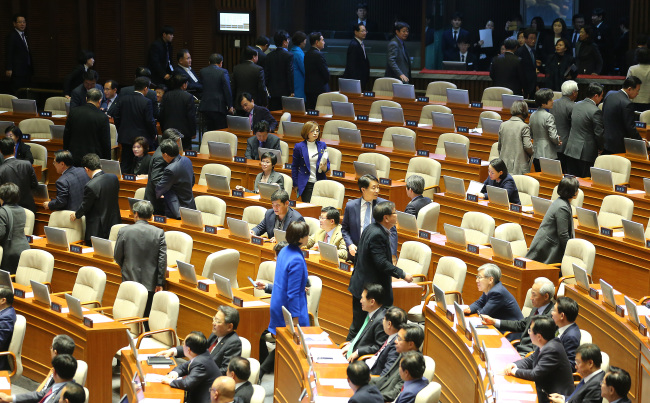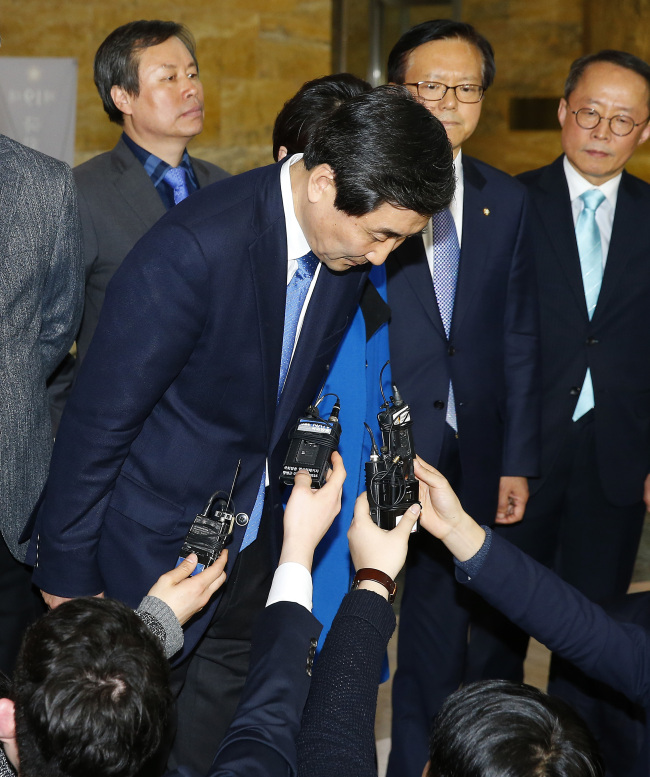Assembly passes antiterrorism bill despite oppositions’ pushback
By Yeo Jun-sukPublished : March 2, 2016 - 23:19
The National Assembly on Wednesday gave final approval to the legislation granting the intelligence agency enhanced capability to address terror threats with authority to monitor potential terror suspects.
The lawmakers then approved other stalled bills such as those redrawing constituencies for the April general elections and addressing North Korea’s human right condition by allowing the government to set up a center tasked with investigating Pyongyang’s human right abuses.
The bills cleared its biggest hurdle in the late evening when The Minjoo Party of Korea suspended its 192-hour filibuster aimed to prevent the counter-terrorism bill from coming to the floor for a vote in a plenary session.
The legislature passed the counter-terrorism bill 156 to 1, with the 107- member Minjoo Party boycotting the voting session in protest of the government-backed the bill. The rival parties passed the North Korea human right bill and the election bill 212 to 0, 174 to 34, respectively.
“We condemn the Saenuri Party for unilaterally passing the counter-terrorism bill,” said the Minjoo Party's interim leader Kim Jong-in. The main opposition submitted their own revised version of the anti-terrorism bill, only to have it blocked by 107 to 156 vote.

The result was widely expected after Assembly Speaker Rep. Chung Ui-haw invoked his authority to take the anti-terrorism bill to floor nine days ago. The ruling Saenuri Party holds a majority of 157 seats in the 293-member Assembly.
The liberal opposition parties have long been against the security bill’s “toxic clauses.” They have claimed the measure would allow the National Intelligence Service to arbitrarily determine the scope of terror suspects and collect their phone records and financial statements without a warrant.
The Minjoo Party and minor Justice Party have accused the Saenuri Party of refusing to accept their calls to revise the disputed clauses, later launching the filibuster that set the record for the world’s longest relay debate.
But the marathon speeches, the country’s first since 1969, are seen to have failed to translate into wider public opposition to the controversial bill. Recent opinion polls suggest the voters are almost evenly split on the filibuster to amend the bill.
“It is yet another snapshot of Korea’s politics,” said Jun Kye-Wan, a political analyst at Korea’s Knowledge Center. “The Saenuri Party knew that the Minjoo Party would back down and they have been taking advantage of the situation in their favor,” the analyst said.
The Saenuri Party has rebuked the opposition-led filibuster as a political stunt to promote the liberal lawmakers’ profiles in the run-up to the general election. Conservative party leader Rep. Kim Moo-sung warned that the move would backfire during the election.
Acknowledging the challenge, the Minjoo Party’s leader Kim Jong-in reportedly pressured the party’s whip Rep. Lee Jong-kul into calling an end to the filibuster. Lee, the first to propose the measure, was the last speaker, delivering a speech for more than 12 hours, now the longest filibuster in Korea’s history.

While highlighting that the filibuster brought voters’ attention to the “advanced” democratic procedure, analysts said the decision to quit the move was an inevitable call to prevent political repercussions ahead of the elections.
“The filibuster serves as an opportunity to tell the voters that the Assembly has a democratic rule such as the filibuster,” said anaylst Jun. “Now the opposition should move beyond the filibuster and find a way to construct another narrative against the ruling party,” he said.
Yoon Pyeong-joong, a political philosophy professor at Hanshin University, agreed: “The filibuster highlighted the nature of democratic rule. Since the opposition has gained more than they had expected, they should focus on other issues, such as economic ones.”
Echoing the political significance of the filibuster, which can prevent a majority from pushing through controversial bills, Jun noted that the opposition should have fought to the end at the risk of their political careers.
“Once they start, they have to continue until it ends. If they believe that the bill would vastly undermine civil liberty, they have to continue their efforts to convince the people even if it costs their parliamentary seats,” said Jun.
By Yeo Jun-suk (jasonyeo@heraldcorp.com)



![[Herald Interview] 'Amid aging population, Korea to invite more young professionals from overseas'](http://res.heraldm.com/phpwas/restmb_idxmake.php?idx=644&simg=/content/image/2024/04/24/20240424050844_0.jpg&u=20240424200058)







![[Hello India] Hyundai Motor vows to boost 'clean mobility' in India](http://res.heraldm.com/phpwas/restmb_idxmake.php?idx=644&simg=/content/image/2024/04/25/20240425050672_0.jpg&u=)





![[Today’s K-pop] NewJeans' single teasers release amid intrigue](http://res.heraldm.com/phpwas/restmb_idxmake.php?idx=642&simg=/content/image/2024/04/26/20240426050575_0.jpg&u=)